Therapy dogs — as well as guide dogs — provide a level of accessibility to humans. Without these handy helpers, people with differing abilities would otherwise lack the ability to move around on their own or interact freely with the world.
While most dog breeds and mixes can become great therapy dogs with the proper training, some breeds and their hallmark traits have a higher proclivity to succeed long-term as therapy dogs. Golden retrievers and German shepherds make the list as consistently used service dog breeds — but some other, newer breeds on this list might surprise you!
Keep reading to discover the 26 best therapy dog breeds — including the best therapy dog breeds for impairment, companionship, allergy detection, and more.
Top Therapy Dog Breeds for the Visually or Hearing Impaired
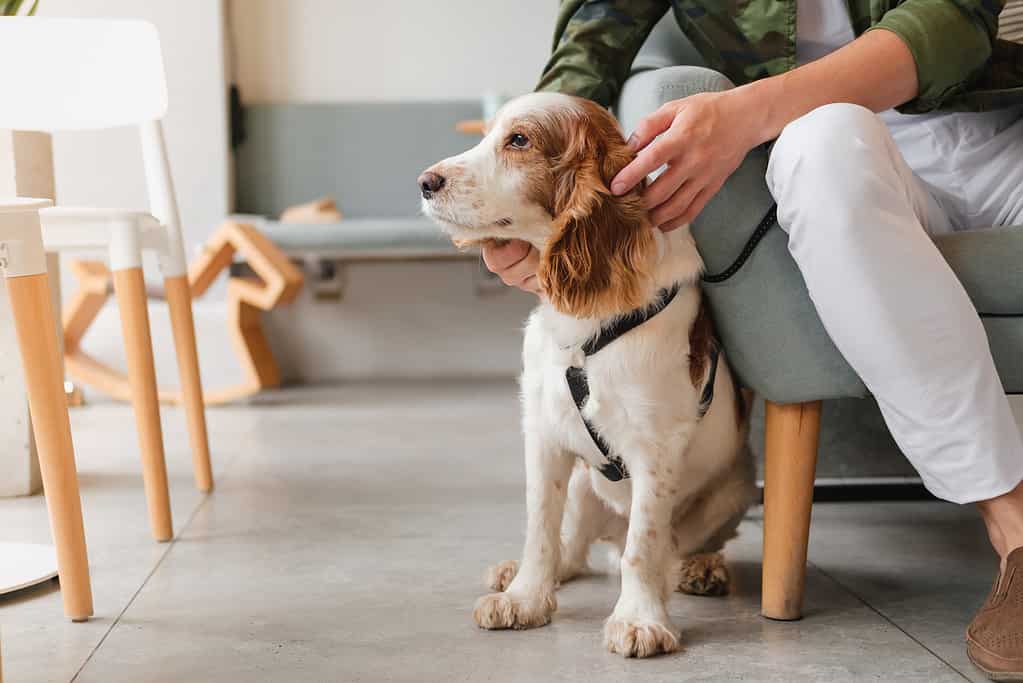
Spaniels are one of several dog breeds skilled in helping the visually or hearing impaired get around in the world.
©Photoboyko/iStock via Getty Images
When working as a guide dog for the hearing or visually impaired, these pups need to have problem-solving skills as well as emotional intelligence and empathy to understand the complete picture of a situation.
Golden Retrievers
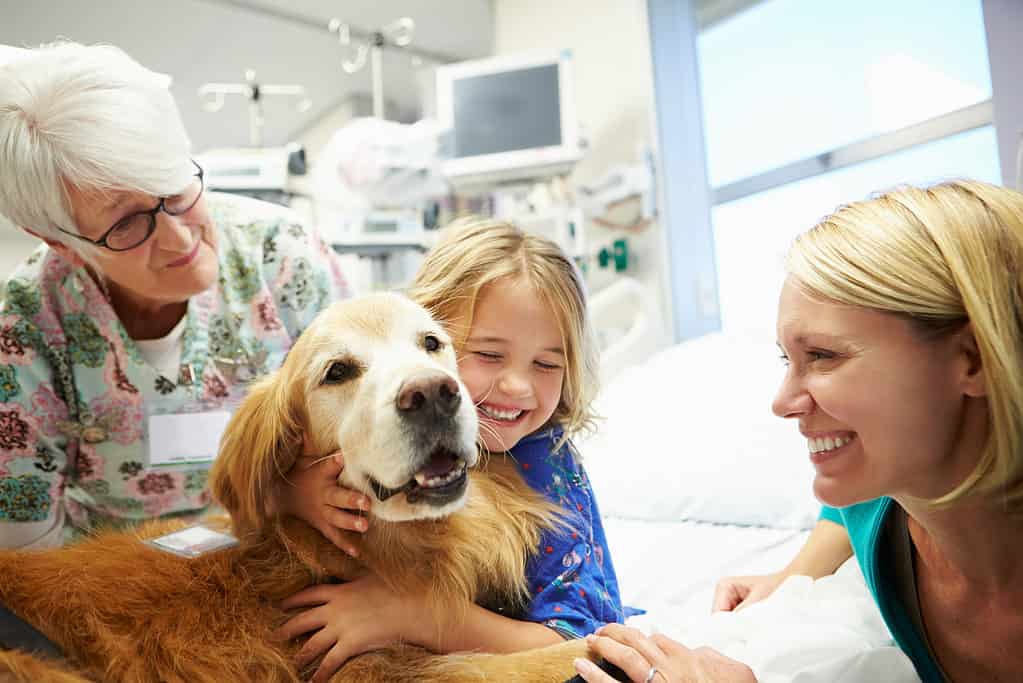
Golden retrievers have the emotional intelligence to serve as a therapy, service, and emotional support animal.
©monkeybusinessimages/iStock via Getty Images
It’s no wonder that the dog breed with one of the highest emotional intelligence scores serves as a wonderful therapy dog. Golden retrievers provide a calming presence to those who are visually or hearing impaired — expertly leading their owners through and around the world while keeping themselves tuned into the human’s feelings. With the proper training, golden retrievers can shift gears from guiding work to calming their owner amid a stressful situation.
Labrador Retrievers
Did you know that the Labrador retriever persists as the most popular service dog breed today, according to VCA Animal Hospitals? The lab’s manageable but sturdy size, as well as its shorter coat and gentle, eager temperament, creates a near-perfect therapy dog. Labrador retrievers find work as guide dogs, therapy dogs, and emotional support dogs with their hallmark traits of loyalty and unconditional love.
German Shepherd
The intelligent and affectionate German shepherd pulls “double duty” just like the retriever breeds already mentioned. While not as naturally calm as a golden retriever, the German shepherd can become a reliable pillar of calm during hectic situations for their owner with the proper training. When it comes to guiding and leading work, German shepherds top the charts for their ability to learn and adapt.
Collies
Astonishingly, each one of the nine types of collie breeds can serve as a helpful and loving therapy dog for the visually impaired. Their nuanced intelligence and eagerness to please their owners enable them to perform the job well. Border collies, a breed best suited for therapy work with veterans, remain a common pick when training therapy dogs.
Dobermans
Recently, more and more trainers have realized how helpful the Doberman’s nature is in therapy situations. It remains a protective, loyal, and alert breed. As such, Dobermans succeed at noticing even the slightest shift in emotions, navigating a hectic situation, and gently intervening in self-injury health crises.
Cocker Spaniels
Specifically advantageous for the hard of hearing, cocker spaniels don’t often top the charts when you think about common therapy dog breeds. However, the cocker spaniel is a small, smart, alert breed with exceptional hearing. They learn in training to alert their owner to sounds like alarms, sirens, and other common alerts — they even learn to bring their owner to the source.
Top Therapy Dog Breeds for Senior Companionship

Smaller, happy breeds like spaniels and Pomeranians make loving senior companions.
©monkeybusinessimages/iStock via Getty Images
When seniors develop disease or lose loved ones, companionship becomes all the more important to maintain a proper quality of life. Hospice patients also benefit from canine visits. According to Samaritan, a New Jersey-based hospice and palliative care company, visits from hospice therapy dogs show marked increases in the mental, emotional, and physical vitals of patients.
Cavalier King Charles Spaniels
Specifically trained to provide comfort for those in need of a brighter day, cavalier King Charles spaniels use their soulful eyes and calming presence to lift the spirits of everyone they meet. Cavs with a loving and warm temperament enjoy resting on your lap or sitting to be petted for an hour or two.
Havanese Spaniel
A surprising breed to make the list of great therapy dogs is a Havanese — the small, sweet, well-tempered pup is an incredible senior companion. They’re small, don’t need a ton of grooming, and have a funny and extroverted personality that lights up every room they enter.
“Most breed members … have a laidback and easy-going nature, meaning they can fit well into even busy households,” said Dr. Linda Simon of Fetched. “Probably their most notable personality trait is how they can become closely bonded to their owner.”
Pomeranian
The Pomeranian can excel at senior companionship and hospice therapy if it has the right temperament. While the breed member should have an outgoing personality and be able to stay calm in stressful or hectic situations, Pomeranians can provide humor, love, and comforting snuggles to the population in question.
Pug
Pugs might not make the best guide dog — but they excel at working with a handler for intellectual and psychiatric therapy. The pug has a sharp intelligence and adapts quickly to different situations. Couple that with their loyalty and love, and pugs make great practitioners of deep pressure therapy and intruder notifications.
Bichon Frise
For most breed members, the bichon has nearly every characteristic needed to succeed as a therapy dog. They’re loyal, loving, smart, great at problem-solving, empathetic, and outgoing. Bichons walking into a nursing home or hospice facility have their work cut out for them — not only are they great therapy dogs for their personalities; but they’re adorable, sweet, and snuggle-able too.
Top Therapy Dog Breeds for Seizure and Allergy Detection
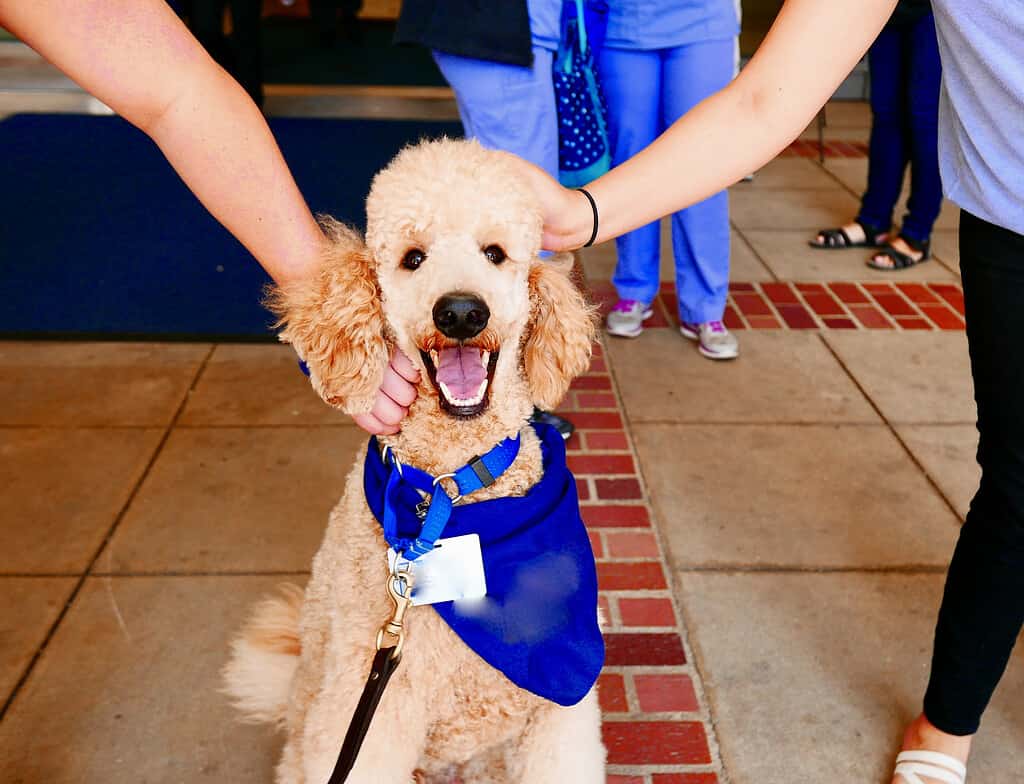
Poodles and “doodles” serve humans with neurological disorders or allergies well.
©Laura Fay/iStock via Getty Images
Therapy dog work differs based on the definition. One application of therapy dogs is for humans who have recurrent seizures or near-fatal allergies.
Poodles
The unmatched intelligence of a poodle allows it to learn hundreds of unique commands — including how to alert a human and respond to impending seizures. Trained poodles can alert their owners to upcoming seizures, bring medication to them, or even find a cell phone to allow their human to call for help. Poodles are also hypoallergenic, which becomes all the more important when they’re trained as allergy-detection dogs.
Labradoodles
When it comes to labradoodles, they can perform almost any therapy function with ease (and proper training). They do a great job at noticing the signs of neurological conditions and warning their owners when a seizure is imminent. They’ll help their owner find somewhere safe to wait out the experience and protect them from harm during the seizure.
Bloodhound
Long-revered for their superior sense of smell, the bloodhound can receive training to detect trace amounts of peanut, soy, and other allergens. Those with severe allergies to certain ingredients can rely on bloodhounds to find small amounts and “okay” food for consumption.
Irish Water Spaniel
The hypoallergenic Irish water spaniel has a long life expectancy, an alert and intelligent temperament, and a large enough size to check public seats, tables, desks, and more for allergens. They were bred as sporting dogs — which means they’re energetic and motivated to retrieve or find what they’re trained to search for.
Portuguese Water Dog
For the last stellar breed which is both hypoallergenic and a hard worker, the Portuguese water dog makes a great therapy dog for allergy detection. This intelligent breed is a docile, intelligent dog with a long lifespan and an obedient temperament. Their trainability makes them a versatile helpers in therapy situations.
Top Therapy Dog Breeds For Veterans
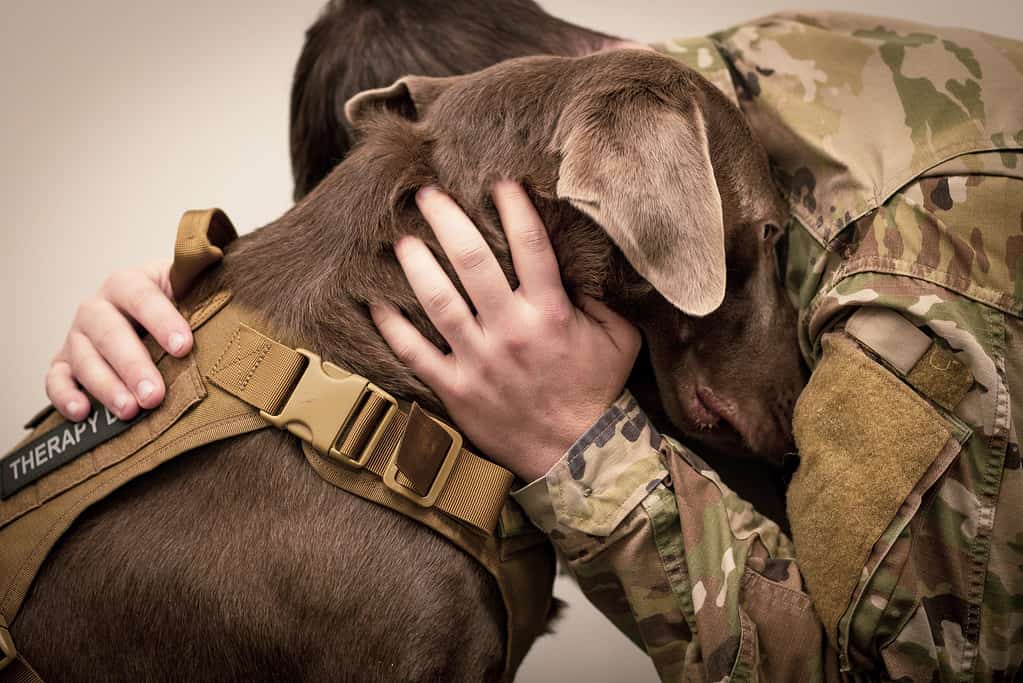
Veteran support dogs protect, love, and adventure with their owners.
©Jason Hohnberger/iStock via Getty Images
The brave men and women who serve in the military come back with scars — and not all of them physical. The National Center for PTSD estimates that nearly 20% of women veterans and 10% of men have PTSD from their service. Furthermore, veterans sometimes need mobility assistance if they’ve lost a limb in battle.
Greyhound
The quick, compassionate greyhound makes a great service dog for veterans based on its size and abilities. Most known for their ability to run, greyhounds can aid in mobility-related issues and maintain a mellow temperament through most situations.
Bernese Mountain Dog
Veterans in specific need of emotional support can lean on the Bernese Mountain dog’s goofy, gentle, and affectionate nature. Bernies remain steadfastly loyal to their owner and act as trusted companion when trained as an emotional support animal.
Boxer
Since World War II, soldiers have chosen boxers as pets after coming home from the war. Boxers have it all — they’re kind, intelligent, and eager to please their owners. With so much love in their hearts, boxers adapt well to emotional support training.
Border Collie
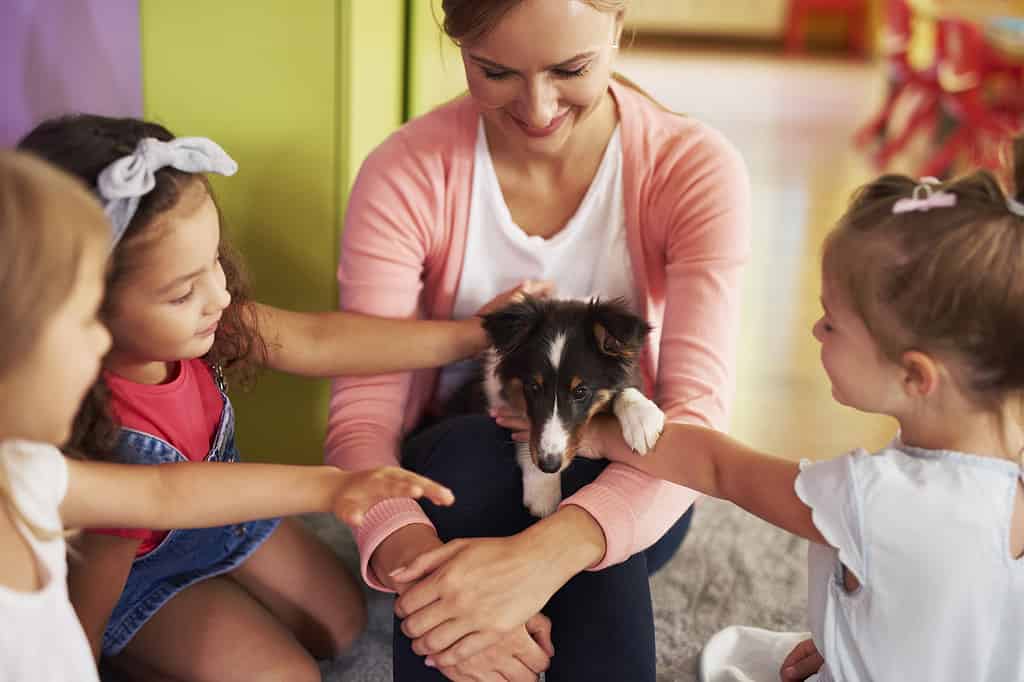
Collies have the energy and gentle nature to bond well, enjoy exercise, and protect their families.
©gpointstudio/iStock via Getty Images
As mentioned above, border collies serve veterans exceptionally well for both emotional and physical support. Wary of strangers, the border collie will bond closely with its owner and protect them from figures outside their immediate circle of friends and family. The consistent mirth and zeal of a border collie also brightens an owner’s day.
Papillon
Because papillons like to work but don’t have the size or muscle to help with heavy lifting, these little pups serve as great emotional support animals. They will stay active with their owner and can become downright clingy with the family member who relies on them most.
Yorkshire Terrier
Did you know one of the very first therapy dogs was a small Yorkie used to help its owner stay calm through dengue fever and PTSD symptoms? Yorkies have a brave and intelligent demeanor that will protect their owners — but when it comes to family life, the dog turns on the charm and has a playful, loving disposition.
Top Therapy Dog Breeds For Emotional Support
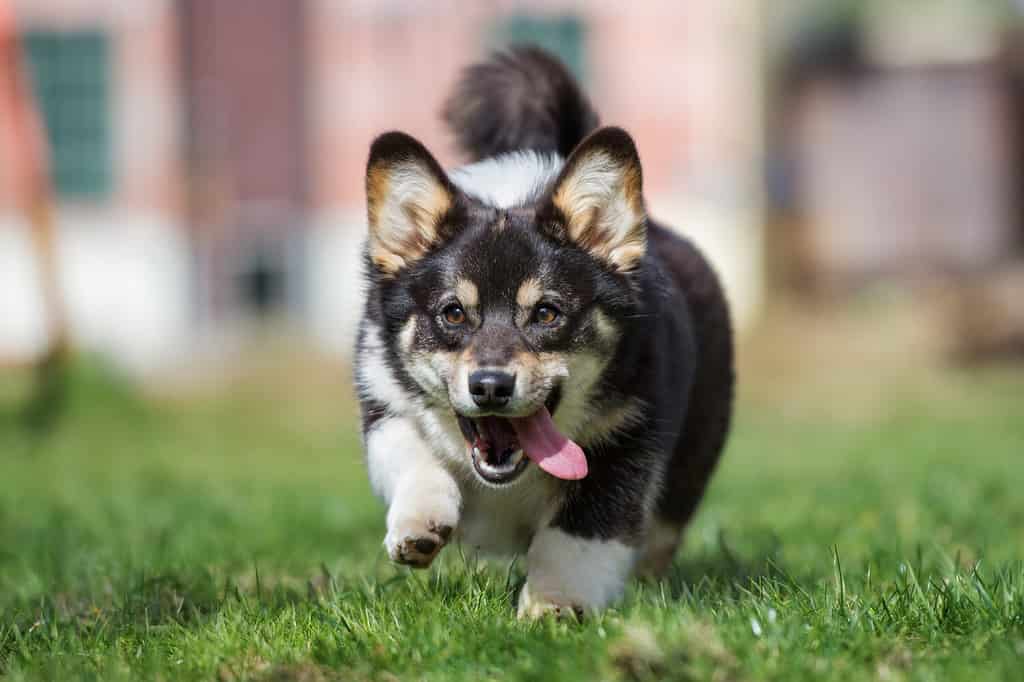
Corgis make the perfect emotional support dog thanks to their personality and exercise needs.
©otsphoto/Shutterstock.com
Emotional support therapy spans the gamut of responsibilities. Emotional support dogs in this category may support their intellectually disabled owner, provide comfort for a psychiatric issue, or act as a necessary companion for daily life.
Bullmastiff
The guard-like bullmastiff has an incredibly gentle soul for its size. Used in hospitals, hospice settings, and schools, bullmastiffs make great emotional support animals. Not only does their size allow them to work as mobility aids, but their weight enables bullmastiffs to do deep pressure therapy that can help with anxiety and depression.
Newfoundland
While not used as widely as other breeds, Newfies are great service dogs for those who struggle with stress and anxiety. The Newfoundland does need room to roam, play, and explore, so they’re only a good choice for humans with mood disorders who also have a large enough yard.
Pit Bull Terrier
The intelligence, loyalty, and empathy of a pit bull make it a great choice for a therapy dog. After finishing basic obedience, you can teach a pit bull how to respond in certain situations that serve as triggers for humans with anxiety, depression, PTSD, or a history of self-injury. Pit bulls are affectionate as well, allowing their owners to feel comfort and love from a companion on their dark days.
Corgi
The even-keeled, well-tempered corgi makes a great emotional support dog for several reasons. It’s an easily trained dog, small enough to perform deep pressure therapy on most owners, relatively quiet, and extremely loyal to its family. Corgis also love to work, as they were originally bred as herding dogs, so the breed and its members excitedly meet the challenge of taking on the responsibility of upholding their owner’s emotional well-being.
Your Right-Paw Friend
Therapy dogs allow people with differing abilities to reclaim their lives in a multitude of ways. Not only can they physically guide their owners through obstacles, but they can alert them when a seizure or allergy is present, calm them down after an anxiety attack, and provide companionship for the hardest days.
The photo featured at the top of this post is © hrt2hrt/iStock via Getty Images
Ready to discover the top 10 cutest dog breeds in the entire world?
How about the fastest dogs, the largest dogs and those that are -- quite frankly -- just the kindest dogs on the planet? Each day, AZ Animals sends out lists just like this to our thousands of email subscribers. And the best part? It's FREE. Join today by entering your email below.
Thank you for reading! Have some feedback for us? Contact the AZ Animals editorial team.






